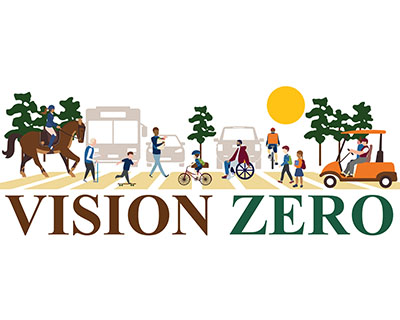Wellington could become the first municipality in Palm Beach County to approve automated speed enforcement in school zones if the Wellington Village Council chooses to do so on Tuesday, Oct. 8, a representative for a company providing such equipment said at a meeting last week.
“You all might be the first, just based on the calendar, to actually approve it,” said David De La Espriella, vice president of client relations for RedSpeed USA, at a meeting of the Wellington Education Committee on Tuesday, Sept. 24.
He added that Loxahatchee Groves and Delray Beach were considering putting it before their councils.
The village would not pay anything for the system but would allow vendor RedSpeed to install and maintain the automated equipment and generate $100 civil fines for speeding. The fines would arrive in the mail after the system identifies the car owner by license plate.
Violations are issued for speeds more than 10 miles over the posted limit, according to the company.
In testing, the company found more than 1,100 violations for speeds at least 11 mph over the limit in one day at Binks Forest Elementary School in Wellington, De La Espriella said. Another school in the village had more than 1,000 in a day.
Part of the proceeds would go to the Palm Beach County School District. Wellington would get $60 per $100 fine, and RedSpeed would receive $21 of that $60 for acting as the village’s contractor, De La Espriella said.
“Deputies can’t be in every school zone at every minute of the day, but my cameras can,” he said.
In June, De La Espriella retired from the Miami Beach Police Department, where he was assistant chief of operations, but soon agreed to work for the speed-camera firm.
A 2023 state law set down guidelines for how a county or municipality can choose whether to put an automated speed detection system in school zones.
Fines must be for violations in posted speed zones during school hours and extending half an hour before and half an hour after those hours. For the first 30 days after a municipality adopts the system, violators receive only warnings. Officials must also launch an awareness campaign to alert residents about the equipment. If the necessary approvals happen, the warning period could start in Wellington in January, officials said.
“The citation that’s issued, is that issued by the Village of Wellington?” Committee Member John Webber asked.
“All the branding is Village of Wellington,” De La Espriella said. “There’s nothing we send out to violators that says RedSpeed.”
The civil fines do not cost drivers points on their license or affect insurance, though refusal to pay after an established review process could send a violation to the court system, he said.
The village must provide a magistrate to hear any driver appeals and a law enforcement official to approve each notice of violation identified by the company. RedSpeed handles the rest, he said.
“I think this is amazing for the safety of the students,” Committee Member Melissa Raineri said.
In this instance, the committee was hearing a presentation and not voting on a recommendation to the council.
The concept is not unlike red light cameras, which are automated and produce mailings to drivers. Such systems have seen ups and downs in popularity among various communities over the years, with research indicating they can reduce right-angle crashes but increase rear-end collisions when nervous drivers slam the brakes at a yellow light, for example. Sometimes there has been pushback against “gotcha” government, which also happens to benefit a for-profit vendor, for things like a slow, tap-and-go right on red in light traffic.
In this case, the automated fines are focused exclusively on speed in school zones, though law enforcement can request video footage stored for 45 days if it sheds light on other possible violations. Supporters say it acts as a “force multiplier” for deputies on traffic work and offers an incentive for drivers to alter behavior in a way that makes children safer.
For example, a presentation said the fatality rate of someone hit by a car at 20 mph is 10 percent, compared to 40 percent at 40 mph, and 98 percent at 58 mph.
“This project came to us through our Vision Zero initiative, which is all about making our roads safer,” said Nicole Coates, Wellington’s director of emergency management and public safety.
The goal of Vision Zero is no traffic deaths or serious injuries within the village by 2030.
“I hope we’ll be hearing more to do this,” School Board Member Marcia Andrews said of the idea.
A Palm Beach County Sheriff’s Office representative said that the PBSO was able to put officers at each village school for the first two weeks of the school year, but now has settled into a typical rotation for school traffic enforcement.








